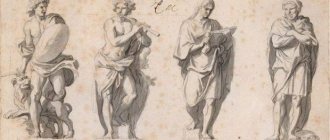What is the difference?
Temperament is the foundation on which personality is formed as a social being. Traditionally, there are four types of temperament:
- sanguine,
- choleric,
- phlegmatic person,
- melancholic.
“Temperament can be determined from childhood: it is enough to observe the child and note a number of characteristic features inherent in one type or another.
There are also many psychological tests, by answering the questions of which you can easily classify yourself as one type or another,” says Nina Novichkova, sales director of the recruiting company Adecco Group Russia. Temperament can be determined from childhood.
Corresponding member of the Russian Academy of Natural Sciences, Candidate of Medical Sciences, psychotherapist of the European registry Mikhail Litvak in his book “The Sperm Principle” discusses how important it is to take into account your temperament when choosing a profession. “Activity characterizes the expression of a person’s energy potential, with which a person achieves a goal and overcomes obstacles,” notes Mikhail. — Activity is, of course, the main quality of temperament that contributes to achieving the goal. The phlegmatic person is most active. True, due to low reactivity, the phlegmatic person turns on somewhat more slowly. To my surprise, there were quite a few phlegmatic people among the goalkeepers. Their reaction is fast, but they achieve this speed slowly. Interruptions are detrimental for them.” When Mikhail was a consultant in the handball team, he advised the coach not to replace the main goalkeeper (she turned out to be phlegmatic) for one or two minutes, since it is difficult for her to get involved every time, but to replace her completely when the game is already over. He advised the tennis player, who almost always lost the first game, to take this fact calmly and just warm up longer.
The fact is that it is difficult to go against nature. If you are a phlegmatic person, do not take breaks from your studies. Don't be afraid to get overtired. You have enough energy for three. A choleric person with high activity and reactivity can do a lot and still swear, even when his partner does not hear him (for example, sometimes a driver curses another driver whose car is already far away). Well, swear if it makes you feel better, but remember that it is a waste of energy. Sanguine people are quite active, but if the activity is monotonous, they can quickly lose interest in it. It is better for them to choose an occupation where they need to switch frequently. Organizing corporate evenings, mass celebrations, dispatch work - this is the field of activity for a sanguine person. For a phlegmatic or melancholic person this is disastrous. The melancholic person has the lowest activity: he requires special conditions for work, preferably an office environment.
The pace of reactions determines the speed of mental processes and is easily measured by the number of associations (thoughts) per unit of time. It is elevated in choleric people, sanguine people, as well as in well-rested melancholic people. Phlegmatic people have slower reactions. Ignorance of these features often leads to misunderstandings. Among managers of various ranks, one can quite often find choleric and sanguine people with an accelerated rate of mental reactions. If they do not know the psychological laws of communication and, moreover, they have reduced sensitivity (the ability to feel, understand another person), they do not notice that their subordinates - phlegmatic and melancholic - do not have time to follow the course of their thoughts. Managers get the impression that their subordinates are stupid. In accordance with this conclusion, personnel placement, work distribution, etc. occur. Often, bosses are happy to get rid of melancholic people, and then with surprise and bitterness they learn what profit this slow worker brought to another enterprise. Phlegmatic and melancholic people should try to increase their rate of mental reactions. The best help here is not psychological exercises, but game sports.
What is temperament
Temperament is a complex of individual personality characteristics that determine the dynamics of its behavior and mental activity.
Temperament
It is laid down at birth and depends on the nervous structure of the body, the type of its higher nervous activity.
Each type is a variant of the norm and has its own positive and negative features. Character is formed on its basis. Temperament cannot be changed. You can only correct its manifestations. Character changes in the process of development, with the help of education, under the influence of society.
Temperament types
It is rare to find people with clearly defined traits of one type of temperament. As a rule, people have temperaments that include characteristics of different types. The predominance of traits of one type of temperament predetermined the possibility of assigning an individual's temperament to the corresponding type.
The most common classification of temperament types in Russian theory identifies the following types:
- Phlegmatic person,
- Choleric,
- Sanguine,
- Melancholic.
A phlegmatic person is a person who is in no hurry, he is calm and has stable aspirations and mood. Outwardly, he does not show emotions and feelings, but he shows perseverance and perseverance in his work, while maintaining calm and balance. At work, he demonstrates high productivity and compensates for slowness with diligence.
Are you an expert in this subject area? We invite you to become the author of the Directory Working Conditions
A choleric person is a fast and impetuous person. In addition to this, he is completely unbalanced, his mood often and quickly changes with predominant emotional outbursts. This person quickly becomes exhausted, since he is not characterized by the balance of nervous processes.
A sanguine person is a lively, hot and active person. He is characterized by frequent mood swings and a quick reaction to any event that happens around him. This person comes to terms with his own failures and troubles relatively easily. As a rule, a sanguine person has very expressive facial expressions.
A melancholic person constantly experiences various events acutely, reacting sharply to external factors. He is most often unable to control asthenic experiences by force of will. This is a highly impressionable and emotionally vulnerable person.
Choice of profession and characteristics of the nervous system
The basic properties of temperament do not change throughout life, therefore, when choosing a profession, a person must take into account the individual characteristics of nervous activity.
The type of human nervous system is determined by three basic properties of nervous processes:
- By force,
- Mobility,
- Balance.
The strength of nervous processes reflects the ability of an individual's nervous system to withstand heavy loads and stimuli. It is represented by an individual natural feature that shows the endurance and performance of a person during long and intense work. The innate strength or weakness of the nervous system does not change, but by changing and improving habits, it can be regulated.
Are you an expert in this subject area? We invite you to become the author of the Directory Working Conditions
In professional activities, the properties and type of the nervous system are important characteristics. Thus, a person with a strong type of nervous system is able to perform complex, intense and responsible work. Such specialists can sit in front of the control panel for a long time, are ready for emergency and unforeseen situations, and maintain self-control and self-control (for example, dispatchers, power system or production line operators, operator operators, etc.).
People with a weak type are characterized by low endurance of the nervous system. This disadvantage is compensated by other positive qualities, including high auditory, visual and tactile sensitivity. This gives advantages when mastering professions with increased requirements for the sensitivity of the motor analyzer, the accuracy of the eye (for example, watchmakers and radio-electronic
Scientists have established an inverse relationship between the strength of the nervous system and its sensitivity. Today, the fact of high sensitivity and reactivity is no longer in doubt. Persons with a weak type have an advantage over a strong type in monotonous, monotonous work. A strong type will cope better with physical work that is dynamic in nature.
Finished works on a similar topic
Course work Manifestation of the characteristics of a person’s temperament in professional activity 470 ₽ Abstract Manifestation of the characteristics of a person’s temperament in professional activity 230 ₽ Examination Manifestation of the characteristics of a person’s temperament in professional activity 210 ₽
Receive completed work or specialist advice on your educational project Find out the cost
Another feature is the mobility of nervous processes. It reflects the employee’s ability to quickly respond to changes in the world around him. This is an indicator of the speed of change in the processes of excitation and inhibition.
The balance of nervous processes determines the balance that arises between the processes of excitation and inhibition. It regulates their ratio (they are balanced, that is, they have the same strength, or one of them predominates).








